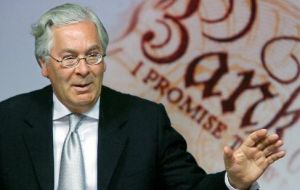MercoPress. South Atlantic News Agency
Bank of England emergency loans at height of crisis peaked £ 61.6 billion
 Bank of England governor Mervyn King warns about “hard times” ahead
Bank of England governor Mervyn King warns about “hard times” ahead Emergency loans to Royal Bank of Scotland (RBS) and HBOS peaked at £61.6 billion at the height of the financial crisis, the Bank of England has said. The Bank revealed for the first time the details of its Emergency Liquidity Assistance (ELA) to both banks in a submission to the Treasury Select Committee.
The duo put up collateral worth more than £100 billion in return for the loans as the financial system was rocked by the failure of Lehman Brothers.
The combined borrowings of both banks - which were charged a fee for the facilities - peaked on October 17 last year, the Bank said.
RBS is now 84% owned by the state following last year's bail-out and the bank's participation in a taxpayer-backed insurance scheme for toxic loans. HBOS was rescued from nationalisation by Lloyds TSB, but the Government took a 43% stake in the combined group as it pumped in cash amid soaring bad debts.
While support for RBS peaked at £36.6 billion on October 17 HBOS borrowed £25.4 billion on November 13 when then-chairman Dennis Stevenson was appealing to the bank's shareholders to back the Lloyds deal.
The Bank of England decided to reveal the figures since the danger of immediate collapse had passed with huge potential consequences for the financial system.
Bank governor Mervyn King told MPs that following the “extraordinary” events of the past year, “it is right that households and companies expect fundamental reform to the structure and regulation of our whole financial system”.
While Mr King said he was “encouraged by signs that a recovery will soon be under way”, he warned the economy still faced “profound challenges”. Around 5% to 10% of the UK's entire economic output - around £100 billion - has been lost “for an indefinite period”, he said.
The governor also warned that lingering banking sector problems would cut credit to households, while worries over unemployment and the need to address the stretched public finances with tax rises or spending cuts would hit spending levels for a ”considerable period”.
Talking in front of a committee of cross-party MPs Tuesday morning, the governor also reiterated his case for splitting up banks to prevent them ever being too big too fail in future. He said: 'Banks have to be subject to the same market discipline as other industries,' stating that if they messed up in future 'they should be allowed to fail.'
He added: 'Regulators have to be tough enough on banks to tell them that if they get too big they need to change their structure, so they are not too big to fail.'
The governor also discussed the UK's sprawling financial deficit. He said there needed to be a 'credible' plan for reducing the deficit, and while he conceded any improvement in the public finances would be contingent on an economic recovery, he said plans to reduce debt could still be made using a central projection of the likely path of the economy as a guide.
On the UK's much talked about credit rating, he added: 'I don't think there is any immediate risk to the UK's credit rating,' although he warned that the longer the country went on without a plan to tackle its huge debt, the more likely there could be problems, especially if other countries saw any negative rating action.




Top Comments
Disclaimer & comment rulesCommenting for this story is now closed.
If you have a Facebook account, become a fan and comment on our Facebook Page!